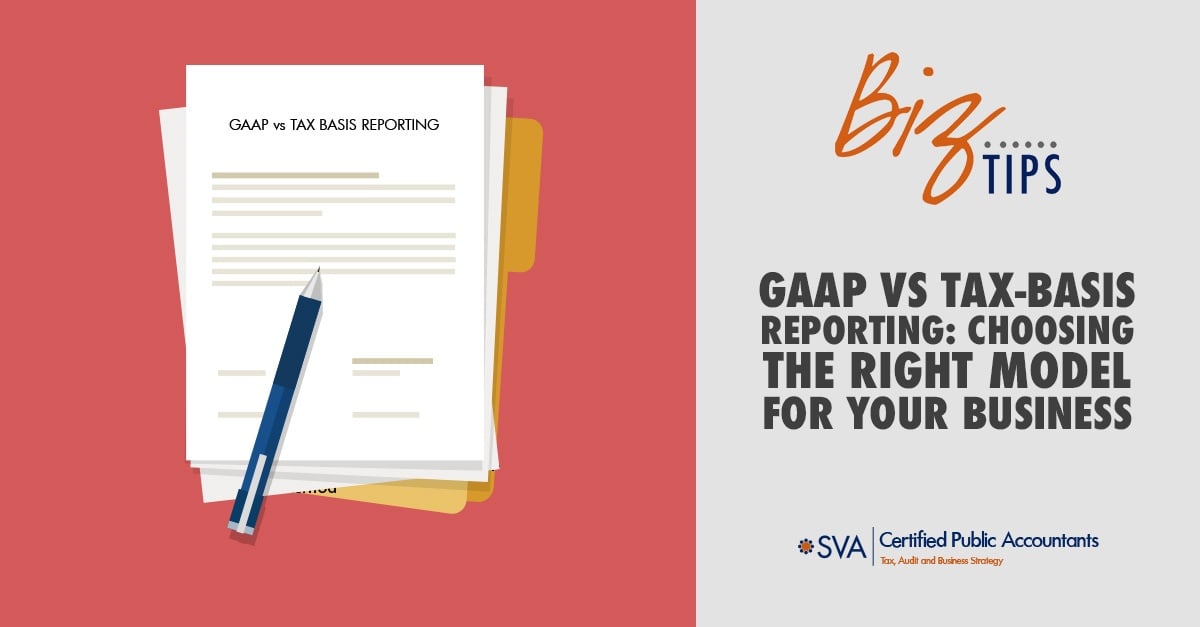| Highlights: |
- Explains GAAP and tax-basis financial reporting, including how each framework recognizes revenue, expenses, assets, and deductions for businesses.
- Outlines key differences in income statement terminology, depreciation methods, allowances, and disallowed expenses under GAAP versus income-tax-basis reporting.
- Compares benefits and drawbacks of GAAP and tax-basis models for public companies, private businesses, lenders, and other financial statement users.
- Guides privately held businesses on choosing the most appropriate reporting basis based on size, capital needs, compliance costs, and stakeholder expectations.
|
Virtually every business must file a tax return. So, some private companies issue tax-basis financial statements, rather than statements that comply with U.S. Generally Accepted Accounting Principles (GAAP). But doing so could result in significant differences in financial results.
(Download Video Transcript)
An Overview of GAAP and Tax-Basis Reporting
GAAP
GAAP is the most common financial reporting standard in the United States, Its standards are established by the Financial Accounting Standards Board (FASB). The Securities and Exchange Commission (SEC) requires public companies to follow it. Many lenders expect private borrowers to follow suit because GAAP is familiar and consistent.
GAAP requires companies to follow accrual accounting, which means that revenues and expenses are recognized when they are earned or incurred, regardless of when the cash is actually received or paid out.
In a nutshell, GAAP is based on the principle of conservatism, which generally ensures proper matching of revenue and expenses with a reporting period. The principle also aims to prevent businesses from overstating profits and asset values to mislead investors and lenders.
Tax-Basis Reporting
Tax-basis financial reporting is based on the tax code established by the Internal Revenue Service (IRS). This reporting is used for tax purposes and focuses on the cash transactions of a business.
Compliance with GAAP can also be time-consuming and costly, depending on the level of assurance provided in the financial statements. So some smaller private companies opt to report financial statements using a special reporting framework. The most common type is the income-tax-basis format.
Tax-basis statements employ the same methods and principles that businesses use to file their federal income tax returns. Contrary to GAAP, tax law tends to favor accelerated gross income recognition and won’t allow taxpayers to deduct expenses until the amounts are known and other requirements have been met.
GAAP vs Tax-Basis
There are a few differences between GAAP and tax-basis reporting.
Reporting Revenue and Expenses
With GAAP, revenues and expenses are reported when they are earned or incurred, while with tax-basis, they are reported when the cash is received or paid out.
Terminology on the Income Statement
Under GAAP, businesses report revenues, expenses, and net income. Tax-basis entities report gross income, deductions, and taxable income. Their nontaxable items typically appear as separate line items or are disclosed in a footnote.
Capitalization and Depreciation of Fixed Assets
Under GAAP, the cost of a fixed asset (less its salvage value) is capitalized and systematically depreciated over its useful life. Businesses must assess whether useful lives and asset values remain meaningful over time, and they may occasionally incur impairment losses if an asset’s market value falls below its book value.
For tax purposes, fixed assets typically are depreciated under the Modified Accelerated Cost Recovery System (MACRS), which generally results in shorter lives than under GAAP. Salvage value isn’t subtracted for tax purposes, but Section 179 expensing and bonus depreciation are subtracted before computing MACRS deductions.
Other reporting differences exist for inventory, pensions, leases, and accounting for changes and errors. In addition, businesses record allowances for bad debts, sales returns, inventory obsolescence, and asset impairment under GAAP.
But these allowances generally aren’t permitted under tax law; instead, they’re deducted when transactions take place or conditions are met that make the amount fixed and determinable.
Tax law also prohibits the deduction of penalties, fines, start-up costs, and accrued vacations (unless they’re taken within 2½ months after the end of the taxable year).
Benefits and Drawbacks
| Benefits |
| GAAP |
Tax-Basis |
| Companies that are publicly traded or looking to raise capital find GAAP reporting essential. It provides investors with a clear picture of a company's financial performance, helping build trust and confidence in the company. |
Smaller businesses or businesses not publicly traded may find tax-basis reporting more beneficial. Since tax-basis reporting is based on cash transactions, it can be easier for business owners to understand and manage. It also allows for certain deductions and credits that can help reduce a company's tax liability. |
| Drawbacks |
| GAAP |
Tax-Basis |
| GAAP reporting can be complex and time-consuming, requiring significant resources to prepare and audit. |
While simpler, tax-basis reporting may not provide a complete picture of a company's financial performance and may not be as useful for investors and other stakeholders. |
Pick a Winner
For publicly traded companies, your only choice is GAAP reporting, as it is required by the SEC. For smaller, non-publicly traded companies, look at your business and the benefits/drawbacks of each type of reporting and see which one would be best for your business.
Contact us to discuss which reporting model will work best for your business.
© 2023 SVA Certified Public Accountants

